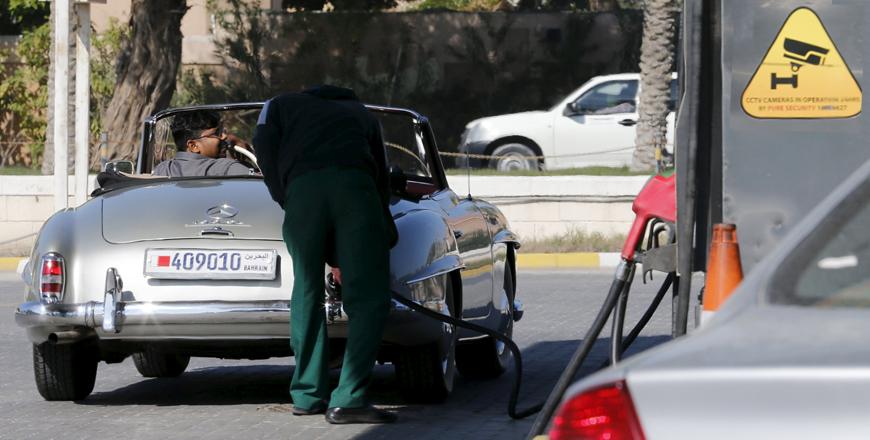You are here
Kuwait projects record deficit
By AFP - Jan 28,2016 - Last updated at Jan 28,2016

Kuwaiti Oil and Finance Minister Anas Al Saleh gives a speech during the Kuwaiti Energy Strategy Forum in Kuwait City this week (AFP photo)
KUWAIT CITY — Kuwait, a member of the Organisation of Petroleum Exporting Countries (OPEC), projected a record budget deficit for the fiscal year starting April 1 on the sliding price of oil, the finance ministry said on Thursday.
The shortfall for the 2016-17 fiscal year is estimated at 11.5 billion dinars ($38 billion) or a massive 30 per cent of gross domestic product (GDP) due to a sharp decline in oil revenues, the ministry indicated on its Twitter account.
Spending was estimated at 18.9 billion dinars, just 1.6 per cent lower than in the current year, the ministry added.
Revenues were projected at 7.4 billion dinars ($24.4 billion) of which oil income was estimated at $19.1 billion or just 78 per cent of the public revenues.
In the past, income from oil contributed more than 94 per cent of revenues in the Gulf emirate, before the decline in crude prices.
The budget was approved at a joint meeting of the Cabinet and the supreme planning council on Wednesday night.
The oil income estimate for 2016-17 is 46 per cent lower than in the current year, and 74 per cent below the actual oil revenues in 2014-15, the ministry elaborated.
The oil revenues are calculated on the basis of a crude price of $25 a barrel, down from the current year's $45 a barrel.
The price of Kuwaiti oil dived to as low as $19 a barrel last week. Currently it is hovering around $23 a barrel.
Kuwait has projected a shortfall of $23 billion in the current fiscal year, the first deficit after 16 years of surplus.
The Gulf state, which has a native population of just 1.3 million, has built around $600 billion in fiscal reserves in those years.
Figures posted on the finance ministry website show that actual income earned in the first three quarters of 2015/2016 fiscal year amounted to $37.6 billion, or 46.2 per cent lower than last year.
The Gulf state posted a provisional deficit of $8 billion in the first nine months. The shortfall normally swells in the last quarter due to accounting adjustments.
All the Gulf Cooperation Council (GCC) states — Bahrain, Kuwait, Oman, Qatar, Saudi Arabia and United Arab Emirates — have posted deficits after oil prices lost three quarters of their value since mid-2014.
The Gulf states have announced a series of austerity measures that included raising the prices of fuel products, electricity, water and others.
Kuwait has liberalised the price of diesel and kerosene and is considering cutting subsidies on other services.
But it is facing difficulties to cut spending which has increased more than four folds since 2006, mostly on wages and subsidies, according to official figures.
The wage bill in the new budget is estimated at $34 billion or 55 per cent of total spending while subsidies account for 15 per cent.
Related Articles
Kuwait posted Wednesday a budget surplus of $45 billion for the latest fiscal year, its second largest on record, but the International Monetary Fund (IMF) warned of underlying risks despite the bumper returns.
DUBAI — An austere state budget released by Saudi Arabia this week is likely to mark the end of an era for the Gulf's lavish cradle-to-grave
Government revenues in Kuwait dropped 4.4 per cent in the first half of the fiscal year due to sliding oil prices, but the energy-rich emirate still reported a healthy provisional surplus.












